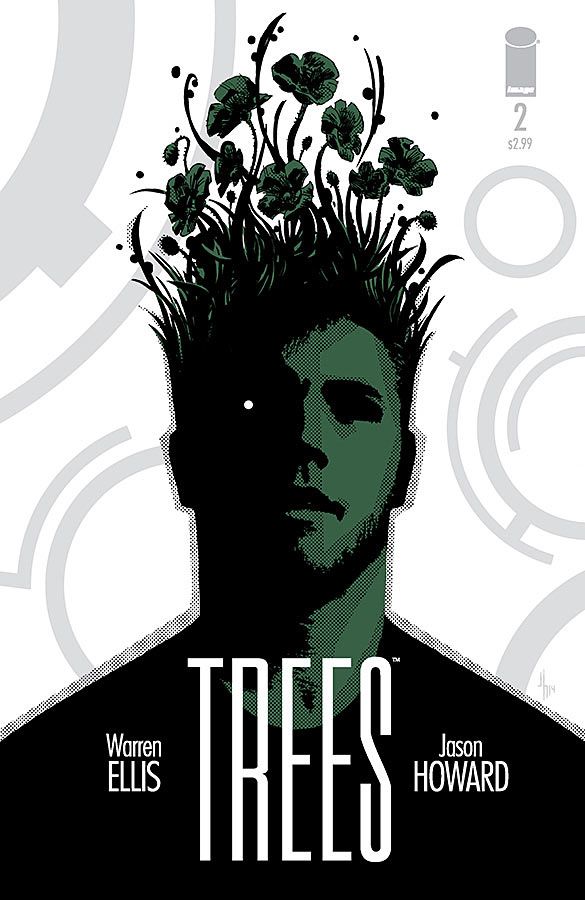"Trees" #2 by Warren Ellis and Jason Howard has a more casual narrative voice than the debut issue. In "Trees" #1, Ellis opened with poetic mystery and wonder of the slow alien invasion and third-person textbox voiceovers. While his concept has some characteristic mischief and humor, Ellis played the Tree invasion with a straight face. The sense of scale and dread is less dominant in "Trees" #2, but in their place is some down-to-earth world building and character development. It's not as showy, but Ellis zooms in, narrowing the scope of "Trees" so that the story takes root.
Ellis picks up the storyline in Blindhail Station in the shadow of a Tree in the Arctic. It's a classic team setup, with the different personalities fanning out comfortably. They are mostly a collection of stereotypes at this point, but Marsh starts to feel more like a person instead of a plot device, and the chatter and conversations convey the feeling of a grumpy scientist family.
It's a human touch that the Blindhail crew has named their Tree, illustrating the human tendency to anthropomorphize, a presumptuous and endearing tendency. Marsh's discovery on the first page is the counterbalance to all the human warmth. The ending bookend revelation about the "poppies" is a refreshingly quiet cliffhanger. It seems anticlimactic, but the more one thinks about it, the creepier it is. All earthly life flows from the energy of the sun. Like the Trees, the Poppies aren't earthly plants; they just have a superficial resemblance.
The Poppies are an echo of the trees -- mysterious, beautiful and probably more dangerous than they seem. It's not a coincidence that Ellis chose the poppy as the flower likeness. Opium comes from poppies, after all. In ancient mythology, the flower has long been used as a symbol of sleep and death.
Admirably, Ellis doesn't just pay lip service to the idea of a global invasion. Most alien invasion stories or even in fantasy epics like "Harry Potter" cop out on this aspect because writing about global war is a difficult act to pull off. War is often better told through one unit than several armies, even though it ends up being only a piece of the story.
Ellis shows impact all over the world, and he does so successfully, although he's taking a risk in slowing down the pace and making his cast so large so early. In "Trees" #2, he introduces two new sets of characters, a couple in Cefalu and a president of Somalia and a journalist. Each scene is just a teaser, but they do successfully outline characters that are utterly unlike the Blindhail research team. Howard emphasizes these contrasts with different color palettes for each setting. Ellis broadens the themes of the story by showing the reaction of different societies and cultures to "their" trees, and how the Trees are now woven into both political strategy and national consciousness.
"Trees" #2 is dialogue-heavy and slow-moving despite its many scene changes, so Howard's attractive and distinctive art does much of the heavy lifting of making an impact. His bristly hair-like linework feels organic and carries tension well. Landscape is where a lot of the beauty and mystery of the story lies, and Howard integrates the Trees into the skeletons of the visuals. The Trees loom in the background and define compositions. They look beautiful, peaceful and comforting, like bridges extended between air and land. A silent full-page spread that is almost a subdued aqua monochrome is particularly lovely.
However, in the Cefalu sequence in "Trees," Eligia looks unnatural and awkward as she runs, and Howard's panel composition is distracting when it's intended to be exciting. Luckily, most of the characters move more slowly and "Trees" isn't an action comic and Howard's facial expressions and his knack for mood and landscape are a great match for the story.
"Trees" isn't a simple invasion or horror story in that Ellis is laying ground for commentary about psychology and sociology. The Other is a classic theme of horror and science fiction, and Ellis and Howard already have a distinctive take on it. It remains to be seen whether the story can live up to its ambition, but "Trees" #2 is excellent if slow-paced groundwork.

